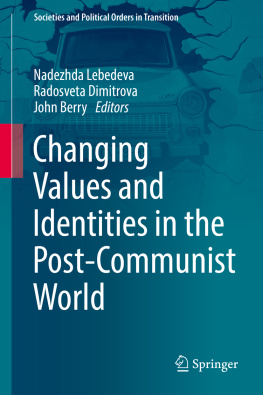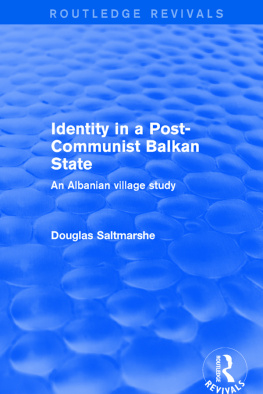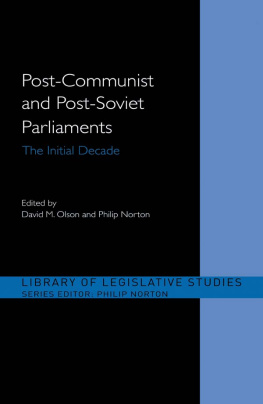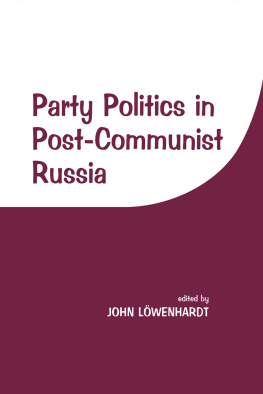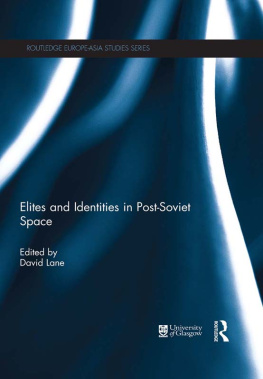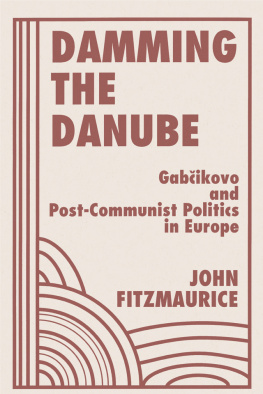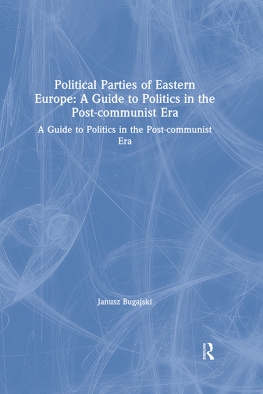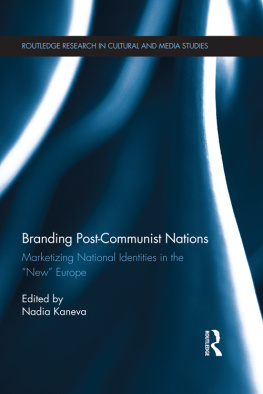Springer International Publishing AG, part of Springer Nature 2018
Nadezhda Lebedeva , Radosveta Dimitrova and John Berry (eds.) Changing Values and Identities in the Post-Communist World Societies and Political Orders in Transition
Nadezhda Lebedeva
(Ph.D., Institute of Psychology, Russian Academy of Sciences) is Professor in the Department of Psychology and Head of the International Laboratory for Sociocultural Research at The National Research University Higher School of Economics in Moscow, Russia. She is Academic Director of double degree Master Program on Applied Social Psychology of HSE, Russia, and Tilburg University, the Netherlands. She is a member of the International Association for Cross-Cultural Psychology (IACCP) and the International Academy for Intercultural Research (IAIR). She is the author/editor of 26 books and over 250 articles and book chapters on social and cross-cultural psychology. Her research interests are values, value transmission, identity, intercultural relations, acculturation, creativity and innovations, and social and cultural change.
Radosveta Dimitrova
is a docent (associate professor) at the Department of Psychology at Stockholm University, Sweden. She holds a Ph.D. in Developmental Psychology (University of Trieste, Italy, awarded the 2009 Best Doctoral Thesis by the Italian Association of Psychologists), and a Ph.D. in Cross-Cultural Psychology (Tilburg University, the Netherlands, awarded the 2012 Student and Early Career Council Dissertation Award of the Society for Research in Child Development (SRCD). She was the recipient of the 2016 Young Scientist Award of the International Society for the Study of Behavioral Development, ISSBD, for distinguished theoretical contribution, research, and dissemination of developmental science. Her research interests regard social identity, well-being, migration, positive youth development, ethnic minority groups (Roma), and adaptation of instruments in different cultures.
John W. Berry
(Ph.D. University of Edinburgh) is professor emeritus of psychology at Queens University, Canada, and research professor, National Research University Higher School of Economics, Moscow, Russia. He received honorary doctorates from the University of Athens, and Universit de Geneve (in 2001). He has published over 30 books in the areas of cross-cultural, intercultural, social, and cognitive psychology with various colleagues. These include Cross-Cultural Psychology: Research and Applications (3rd edition, Cambridge University Press, 2011); Handbook of Acculturation Psychology (2nd edition, Cambridge University Press, 2016); Families Across Cultures (Cambridge University Press, 2006); Immigrant Youth in Cultural Transition (LEA, 2006); Mutual Intercultural Relations (Cambridge, 2017); and Ecology, Culture and Human Development (Sage, 2017). He is a fellow of the Canadian Psychological Association, the Netherlands Institute for Advanced Study, the International Association for Cross-Cultural Psychology, and the International Academy for Intercultural Research. He received the Hebb Award for Contributions to Psychology as a Science in 1999, and the award for Contributions to the Advancement of International Psychology in 2012 (from CPA), the Interamerican Psychology Prize, from the Sociedad Interamericana de Psicologia (in 2001), and the Lifetime Contribution Award from IAIR (in 2005). His main research interests are in the role of ecology and culture in human development and in acculturation and intercultural relations, with an emphasis on applications to immigration, multiculturalism, and educational and health policy.
Klaus Boehnke
is full professor of Social Science Methodology at Jacobs University Bremen and chair of the methods center of the Bremen International Graduate School of Social Sciences (BIGSSSwww.bigsss-bremen.de). Since 2017, he is also deputy head of the International Laboratory for Sociocultural Research at the National Research University Higher School of Economics in Moscow ( https://scr.hse.ru/en ). He received his Ph.D. in Psychology from Berlin University of Technology in 1985 and held assistant and associate professorships at the Free University of Berlin. In 1993, he became full professor of Socialization Research and Empirical Social Research at the Department of Sociology of Chemnitz University of Technology, from where he moved to Jacobs in 2002. He was secretary general of the International Association for Cross-Cultural Psychology (IACCP) from 2000 to 2008 and president of the Division of Political Psychology of the International Association of Applied Psychology (IAAP) from 2004 to 2010; he is now president-elect of IACCP ( www.iaccp.org ). Klaus Boehnke published some 400 academic pieces. His most heavily cited paper is one with Shalom Schwartz on a confirmatory factor analysis of Schwartzs value circumplex. Recently, he was part of an author team that published on the tightness vs. looseness of cultures in Science (lead author: Gelfand). His main research interest is political socialization. Klaus Boehnke is PI of the longest-running longitudinal study of peace movement activists that saw its first of meanwhile ten waves of measurement in 1985. He was a founding member of the Committee for the Psychological Study of Peace (CPSP) in 1988 and has been its senior advisor since 1999; he also was president of the German Peace Psychology Association from 2005 to 2013.
A quarter of a century has passed since the dissolution of the Soviet Union. A whole generation has been raised during this time in all the states belonging to the former USSR or the Eastern European real socialist bloc.). In particular, we can assume that the values and identities of individuals in these countries have changed dramatically during this period.
The balance between stability and change in values and identities across generations is an important issue for societies. Values and identities formed during the socialization period need to be relatively stable in order to provide continuity in the way of life of a society; too much or too rapid change may lead to social disintegration. At the same time, changes in values and identities are also important in order to adapt successfully to increasing contact with other cultures. These contacts bring challenges that need to be addressed by flexibility and a certain degree of modification in the current ways of living. Adaptation to these challenges is equally important in order to avoid social disintegration.
Ways of changing values and identities vary across generations because individuals were socialized at different periods during these social and political changes. Older persons (above the age of 50) were socialized into a society dominated by one political and economic system, while younger persons have been socialized during a period of rapid and inconsistent change. Cohort analysis comparing the values and identities of different generations can show that we are witnessing a generational change linked to a socioeconomic and political development of post-Communist countries.
While a general pattern may exist in which social and psychological changes are linked over time, there are also variations across different regions and countries. Some countries were fully incorporated into the USSR as Soviet Republics, while others had the status of satellites. In addition to these original differences, since the dissolution of the USSR, there have been different trajectories of social and political changes across countries. For example, there has been a rise of nationalist sentiment in many post-Communist countries, ethno-cultural republics within the Russian Federation, as well as among ethnic Russians. In addition, the identity of Russians living in new independent states and ethno-cultural republics within Russia is being transformed as they become aware of themselves as an ethnic minority. In other countries, visions of a new society rooted in historical memories have come to the fore, creating differing trajectories, some based on religion, some on ethnicity, and some on a process of westernization.

